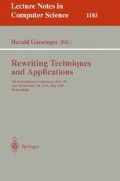Abstract
We generalise the notion of explicit substitution from the λ-calculus to higher order rewriting, realised by combinatory reduction systems (CRSs). For every confluent CRS, R, we construct an explicit substitution variant, Rx, which we prove confluent.
We identify a large subset of the CRSs, the structure-preserving CRSs, and show for any structure-preserving CRS R that Rx preserves strong normalisation of R.
We believe that this is a significant first step towards providing a methodology for reasoning about the operational properties of higher-order rewriting in general, and higher-order program transformations in particular, since confluence ensures correctness of such transformations and preservation of strong normalisation ensures that the transformations are always safe, in both cases independently of the used reduction strategy.
Preview
Unable to display preview. Download preview PDF.
References
Abadi, M., Cardelli, L., Curien, P.-L. and Lévy, J.-J. (1991). Explicit substitutions. Journal of Functional Programming 1(4): 375–416.
Aczel, P. (1978). A general Church-Rosser theorem. Technical report. Univ. of Manchester.
Ariola, Z. M. and Klop, J. W. (1994). Cyclic lambda graph rewriting. Proceedings, Ninth Annual IEEE Symposium on Logic in Computer Science. IEEE Computer Society Press. Paris, France. pp. 416–425. full version forthcoming (Ariola and Klop 1995).
Ariola, Z. M. and Klop, J. W. (1995). Lambda calculus with explicit recursion. Personal Communication.
Barendregt, H. P. (1984). The Lambda Calculus: Its Syntax and Semantics. Revised edn. North-Holland.
Bloo, R. and Rose, K. H. (1995). Preservation of strong normalisation in named lambda calculi with explicit substitution and garbage collection. CSN '95 —Computer Science in the Netherlands. pp. 62–72. 〈url: ftp://ftp.diku.dk/diku/semantics/papers/ D-246.ps〉
de Bruijn, N. G. (1972). Lambda calculus notation with nameless dummies, a tool for automatic formula manipulation with application to the Church-Rosser theorem. Koninklijke Nederlandse Akademie van Wetenschappen, Series A, Mathematical Sciences 75: 381–392. Also chapter C.2 of (Nederpelt, Geuvers and de Vrijer 1994).
Duggan, D. (1993). Higher-order substitution. UW TR CS-93-44. Dept. of Computer Science, University of Waterloo. Waterloo, Ontario, Canada N2L 3G1. 〈Url: http://nuada.uwaterloo.ca/dduggan/papers/≳
Klop, J. W. (1980). Combinatory Reduction Systems. PhD thesis. University of Utrecht. Also available as Mathematical Centre Tracts 127.
Klop, J. W., van Oostrom, V. and van Raamsdonk, F. (1993). Combinatory reduction systems: Introduction and survey. Theoretical Computer Science 121: 279–308.
Landin, P. J. (1964). The mechanical evaluation of expressions. Computer Journal 6: 308–320.
Melliès, P.-A. (1995). Typed λ-calculi with explicit substitution may not terminate. In Dezani, M. (ed.), Int. Conf. on Typed Lambda Calculus and Applications. LNCS. U of Edinburgh. Springer-Verlag. Edinburgh, Scotland. pp. 328–334.
Nederpelt, R. P., Geuvers, J. H. and de Vrijer, R. C. (eds) (1994). Selected Papers on Automath. Vol. 133 of Studies in Logic. North-Holland.
Nipkow, T. (1991). Higher-order critical pairs. Proceedings, Sixth Annual IEEE Symposium on Logic in Computer Science. IEEE Computer Society Press. Amsterdam, The Netherlands. pp. 342–349.
Rose, K. H. (1992). Explicit cyclic substitutions. In Rusinowitch, M. and Rémy, J.-L. (eds), CTRS '92-3rd International Workshop on Conditional Term Rewriting Systems. Number 656 in LNCS. Springer-Verlag. Pont-a-Mousson, France. pp. 36–50. 〈Url: ftp://ftp.diku.dk/diku/semantics/papers/D-143.ps〉
Rose, K. H. (1996). Operational Reduction Models for Functional Programming Languages. PhD thesis. DIKU (University of Copenhagen). Universitetsparken 1, DK-2100 København Ø. DIKU report 96/1.
van Oostrom, V. and van Raamsdonk, F. (1995). Weak orthogonality implies confluence: the higher-order case. Technical Report CS-R9501. CWI.
Author information
Authors and Affiliations
Editor information
Rights and permissions
Copyright information
© 1996 Springer-Verlag Berlin Heidelberg
About this paper
Cite this paper
Bloo, R., Rose, K.H. (1996). Combinatory reduction systems with explicit substitution that preserve strong normalisation. In: Ganzinger, H. (eds) Rewriting Techniques and Applications. RTA 1996. Lecture Notes in Computer Science, vol 1103. Springer, Berlin, Heidelberg. https://doi.org/10.1007/3-540-61464-8_51
Download citation
DOI: https://doi.org/10.1007/3-540-61464-8_51
Published:
Publisher Name: Springer, Berlin, Heidelberg
Print ISBN: 978-3-540-61464-7
Online ISBN: 978-3-540-68596-8
eBook Packages: Springer Book Archive

